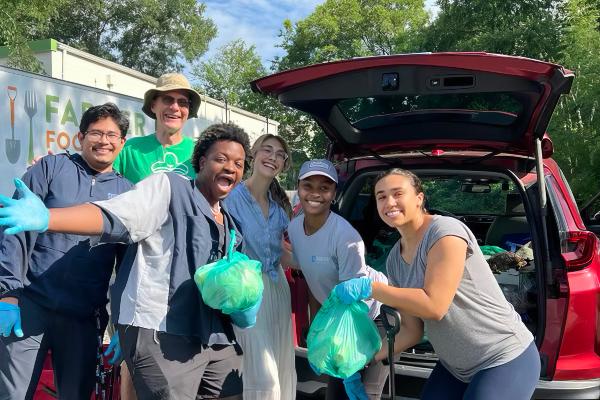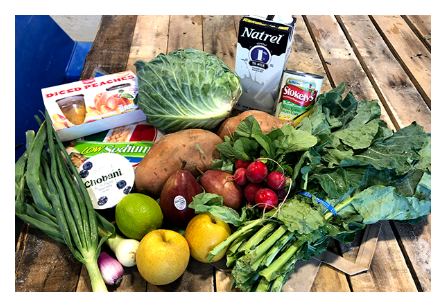
On Saturday mornings, a group of Duke University School of Medicine students who are in training to one day treat cancer or perform surgery gather to ensure that those in the Durham County community have enough nutritious food to eat.
The Fresh Produce Program, part of Root Causes , a medical student organization striving to address social drivers of health, delivers food twice a month to families living in a county where 1 in 10 people face food insecurity. The number jumps to 3 in 10 among non-White men.
The student-run volunteer program is transforming how future physicians approach patient care, but the program’s leaders see both challenges and opportunities ahead.
“We’ve grown tremendously since we started making deliveries in 2020,” said fourth year medical student Trevor Sytsma, a leader of the Fresh Produce Program. “What began as a small initiative has transformed into a direct-to-door delivery model that now supports about 450 community members.”
The growth has been fueled by a collaborative network of medical school students, undergraduates, and faculty from Duke Health and Duke University who have built partnerships with community organizations including Farmer Foodshare, the Food Bank of Central and Eastern North Carolina, El Centro Hispano, and Bagging It 4 Kids.
Fresh, locally grown foods like watermelon, collard greens, sweet potatoes, and onions are delivered alongside recipes to inspire healthy meals. The program has no time limit, meaning families receive food for as long as they need support and live in the area.

Yet, the program that relies heavily on student volunteers who juggle service with their rigorous academic schedules, has reached a pivotal moment.
“We’re outgrowing our roots as a student group,” Sytsma said. “We’re essentially operating a small non-profit, which comes with unique legal and financial demands. On top of that, we’re receiving more interest from Duke providers who want to refer their patients to the program than we can responsibly accept with our current personnel and financial resources. To sustain our work and take on more families, we’re exploring a transition to become an independent entity within Duke.”
Such as shift could unlock new funding streams with fundraising and provide the organizational structure needed to scale up the program.
“We’ve always thrived on the energy and creativity of students,” he explained. “But we’re now focused on building a sustainable model that can meet the growing needs in our community while maintaining the innovative spirit that got us here.”
Duke Health physicians Susan E. Spratt, MD , an endocrinologist, and internist J. Patrick Hemming, MD, MPH ,have served as faculty advisors to the Fresh Produce Program and referred some of their patients to it.
“This is a program that has brought Duke University into partnership with the Durham community in a remarkable way,” Hemming said. “We're so fortunate to have energy and vision from our student leadership.”
Spratt and Sytsma played key roles in bringing the program into NC Cares 360, a platform within the electronic health record system that streamlines patient referrals for essential needs like housing or food.

“But in order to scale, they probably do need to organize differently,” Spratt said. “It would be nice to hire staff to provide that consistent glue as students move on through the years. What they are doing is a symbol of what we want Duke Health to be which is interacting with our community, and helping to address what may not be medical, but still affects patients’ health.”
Food insecurity and obesity often go hand in hand – a surprising paradox for those struggling to get enough to eat.
“What happens is that people in these situations often turn to cheaper food options, which are typically unhealthy,” said Spratt. “These foods are highly processed, loaded with salt, and packed with easily digested carbohydrates. They don’tkeep you feeling full, so you end up eating more.”
Research shows that limited access to nutritious food also makes managing conditions like diabetes significantly harder.
The program stands out for focusing on nutrition, and not just on hunger, said Scott “Esko” Brummel , program manager of the Fresh Produce Program and assistant director for Food and Nutrition Security in Duke’s Office of Community Health. “It’s about supporting food as a key part of a person’s overall well-being.”
Brummel and colleagues are researching how the program is impacting health outcomes.
This innovative approach is also a reflection of the people behind it. The Fresh Produce Program is one of the few, if not the only, medical school-led initiatives of its kind.
“It shows the type of students that Duke Medical School is admitting,” said Spratt. “Students are focused on looking at patients as a whole person beyond their condition or disease. If the medical school had been admitting a different type of person, I don’t think this club would have gotten started, and it would never have continued to succeed through the years.”
You can make a pledge to Root Causes by giving to Duke Health: https://www.gifts.duke.edu/dukehealth?designation=399000173